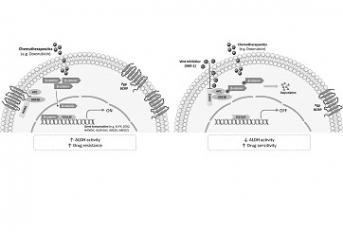Associação Portuguesa de Investigação em Cancro
Chemotherapy induces stemness in osteosarcoma cells through activation of Wnt/β-catenin signaling
Chemotherapy induces stemness in osteosarcoma cells through activation of Wnt/β-catenin signaling

Sara R. Martins-Neves (a-d), Daniela I. Paiva-Oliveira (a,b), Pauline M. Wijers-Koster (d), Antero J. Abrunhosa (b,e), Carlos Fontes-Ribeiro (a), Judith V.M.G. Bovée (d), Anne-Marie Cleton-Jansen (d,1), Célia M.F. Gomes (a,b,c,1) 1.
Joint senior authors, a. Pharmacology and Experimental Therapeutics, IBILI – Faculty of Medicine, University of Coimbra, Coimbra, Portugal;
b. CNC.IBILI, University of Coimbra, Coimbra, Portugal; c. Center of Investigation in Environment, Genetics and Oncobiology (CIMAGO), Faculty of Medicine, University of Coimbra, Coimbra, Portugal; d. Department of Pathology, Leiden University Medical Centre, Leiden, Netherlands; e. Institute for Nuclear Sciences Applied to Health (ICNAS), University of Coimbra, Coimbra, Portugal
Development of resistance represents a major drawback in osteosarcoma treatment, despite improvements in overall survival. Treatment failure and tumor progression have been attributed to pre-existing drug-resistant clones commonly assigned to a cancer stem-like phenotype. Evidence suggests that non-stem-like cells, when submitted to certain microenvironmental stimuli, can acquire a stemness phenotype thereby strengthening their capacity to handle with stressful conditions. Here, using osteosarcoma cell lines and a mouse xenograft model, we show that exposure to conventional chemotherapeutics induces a phenotypic cell transition toward a stem-like phenotype. This associates with activation of Wnt/β-catenin signaling, up-regulation of pluripotency factors and detoxification systems (ABC transporters and Aldefluor activity) that ultimately leads to chemotherapy failure. Wnt/β-catenin inhibition combined with doxorubicin, in the MNNG-HOS cells, prevented the upregulation of factors linked to transition into a stem-like state and can be envisaged as a way to overcome adaptive resistance. Finally, the analysis of the public R2 database, containing microarray data information from diverse osteosarcoma tissues, revealed a correlation between expression of stemness markers and a worse response to chemotherapy, which provides evidence for drug-induced phenotypic stem cell state transitions in osteosarcoma.
Journal: Cancer Letters
http://www.sciencedirect.com/science/article/pii/S0304383515006874




